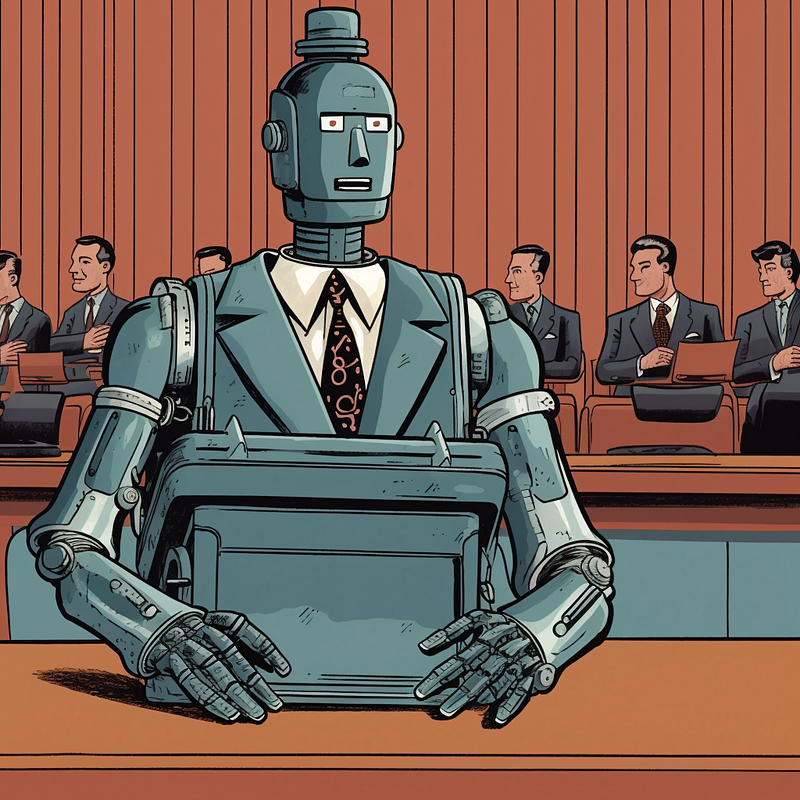Can AI Revolutionize America's Public Defender System?
Written on
Chapter 1: The Dual Justice System in America
In the United States, there exist two starkly contrasting justice systems. One system sees impoverished individuals incarcerated until their trial, relying on overworked and underfunded public defenders, often resulting in conviction. The other allows affluent individuals to secure bail within hours, remaining free until their costly lawyers exhaust their legal maneuvers, frequently leading to acquittals.
The Current Challenges of the Public Defender System
The public defender system was established following the Supreme Court's decision in Gideon vs. Wainwright in 1963, which aimed to guarantee legal representation for those unable to afford it. However, this system faces numerous challenges, including overwhelming caseloads, insufficient funding, and significant racial and economic disparities. These factors contribute to the unfair treatment of marginalized groups.
Public defenders often juggle excessive caseloads that hinder their ability to provide quality representation. Statistics from the National Legal Aid & Defender Association reveal that public defenders typically handle between 150 and 200 felony cases annually, while the American Bar Association suggests a maximum of 150 cases. This overload makes thorough case investigation and trial preparation nearly impossible.
Additionally, public defenders frequently encounter budget constraints, limiting their access to essential resources like training, technology, and investigative assistance. A report from the Brennan Center for Justice highlights that many public defender offices lack the means to employ forensic experts or investigators, which are crucial for building a robust defense.
Racial disparities are also prominent, as the ACLU indicates that people of color are overrepresented among the economically disadvantaged and are more likely to rely on public defenders, who may face challenges accessing their clients, particularly those in incarceration or located far from the courthouse.
What if we could envision a future where AI-driven attorneys outperform human lawyers? Or, at the very least, assist them in managing their caseloads more effectively, thereby improving outcomes for those in need?
The Future of AI in Law
I consulted ChatGPT to outline potential scenarios for the integration of AI in the legal field over the next 1, 5, and 10 years.
1-Year Projection:
Best Case: AI could enhance lawyers' efficiency by automating routine tasks like legal research and document drafting, enabling them to devote more time to strategy and negotiation. This would facilitate improved data analysis and informed legal decisions, ultimately benefiting clients.
Worst Case: On the downside, AI might replace numerous entry-level positions such as paralegals and legal researchers, leading to job losses and reduced diversity within the profession. Furthermore, AI's potential biases could result in errors in legal decision-making.
5-Year Projection:
Best Case: AI could become an integral part of legal practice, with seamless collaboration between lawyers and AI systems. It could assist in data analysis and proactively identify legal issues before they escalate.
Worst Case: The reliance on AI might extend to mid-level roles, causing job displacement and perpetuating existing biases within the legal system.
10-Year Projection:
Best Case: AI could revolutionize the legal field, allowing attorneys to focus on high-level tasks such as client counseling and strategic decision-making while automating basic functions like document review.
Worst Case: In a more troubling scenario, AI might replace senior roles, leading to a lack of human insight and personal connection that clients value. This shift could also introduce complex legal challenges stemming from the opaque nature of AI algorithms.
Editorial Note: These scenarios are not mutually exclusive, highlighting the complexity of potential outcomes.
How AI Can Assist Public Defenders
The primary issue faced by public defenders is the lack of time to understand their clients and thoroughly research cases—areas where AI could significantly alleviate some burdens. While I don't foresee a mass exodus of lawyers or paralegals, an AI capable of conducting client interviews, cross-verifying statements, and scrutinizing police and prosecution documents could drastically improve efficiency.
In the near future, it's conceivable that AI could play a role in court, listening to witness testimonies and assisting the defense team with strategic prompts, such as relevant precedents or suggested objections. Furthermore, AI could analyze witness testimonies in real time, identifying contradictions to address during cross-examination.
As advancements continue, it appears likely that, in the foreseeable future, an effective lawyer may need to function as a "cyborg," integrating AI capabilities into their practice.

Chapter 2: The Role of AI in Enhancing Legal Representation
The first video titled "AI is ruining the internet" explores the implications of AI technologies on various aspects of society, including law.
The second video, "Are we all wrong about AI?" delves into common misconceptions about AI and its potential benefits in different sectors, including legal practices.